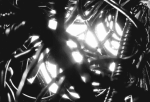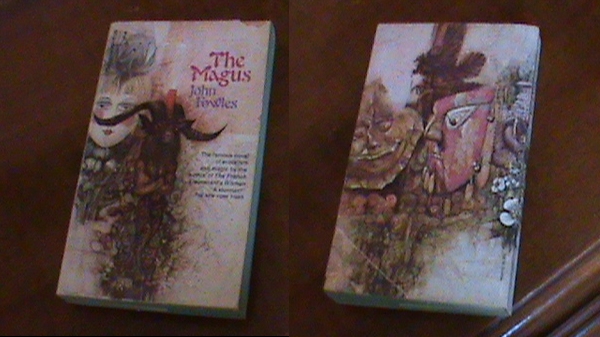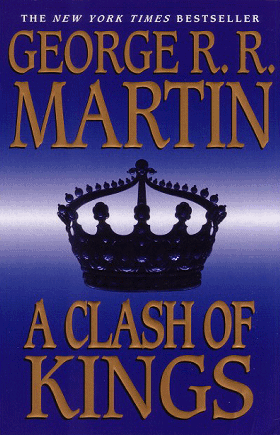
When you pick up a TV series you never know where it’s going to end up and if it will pay off. When you watch shows that play with mythologies and mysteries these stakes are even higher, because they rely far more on the worth of the overall arcs, than the single episode. Recently, Alcatraz revealed itself as awful with the closing of its first (and last) series. It was far, far shallower and more inconsistent (in the sense it lacked substance) than how LOST was. The writers must have been crazy thinking the public would bother going through the same patterns with even more empty baits and unexplained movers. And there’s Fringe, that grew in significance and inventiveness for the first three seasons, steadily improving, but then had a fourth season that became formulaic and proceeded by rehashing the previous three, ending in so much sloppiness and predictable cliches as to not only suck by itself, but also sucking value OUT of what preceded it.
Awake is instead the kind of show that goes as close as possible to a flawless execution. I don’t know what you could have possibly have done better with it. And if I have to explain why the public abandoned it, leading to a cancellation, then I can only find motivations for its complexity and high stakes, not making for a show that can be popular. It is true that Awake also droops into formulaic episodes through its first and middle section, and so feeling like it exhausted what it had to say (Touch also relies on the protagonist following faithfully some magical hand-waving, but that one was renewed, probably because it is a lot more hypocritical and consolatory). It can definitely feel heavy and boring depending how you approach with. Yet it didn’t ignore the hooks that are needed to reach that public, and used them in the best way possible without making them artificial and not pertinent. It wasn’t made as a “esoteric” show for a small group that could appreciate its theme, but made with the actual potential to reach out for a big public. And the execution was up to this task. SO WHY? I think because the general public prefers something (a show) that is not as much ambiguous as this one. If you’re dealing with fantasy, Sci-fi and mythology, then to be successful your show needs to be neck deep into it. Recognizable at a glance for what it is. It needs to use a “language” in the way people expect, and it needs to “surprise” while never daring to come out of the set of expectation and “communicative pact”. Awake, instead, was a show based on a tension itself based on substance you can’t pinpoint. It plays with psychology, perception and reality. It necessarily brings in the metaphysics (or meta-linguistic) aspects of the medium (who’s watching? who’s reliable?). And it is made to continuously challenge your expectations about it, making it hard to frame. Is it Sci-fi? Is it just a procedural? Is he dreaming? Is he dead? What are the stakes? And so obligatory requiring a kind of public that enjoys being put constantly off balance and challenged for real. Requiring an effort to readjust, and even accept the plausibility of its premise (since an openly Sci-fi show can dare doing a lot more without its public freaking out).
So my conclusion is that Awake “failed” (to secure at least a second season) to reach its intended public solely because it deliberately decided to stay outside of a given genre, and to dance on the edges. These days brands and genres aren’t out there in the world, they are hardwired in people’s brains. If you look at commercial successes across mediums you can see that they are always of a tribal nature. Tribes require clearly marked boundaries. Commercial success doesn’t come through authentic challenge, but through identity and beliefs reinforcement. Awake targets a public that is more heterogeneous, so potentially even bigger, but fails to trigger those mechanics that start the identity-making and tribal support. It’s more self-reflexive, personal, and fails building community. Awake was made of three parts: family drama, procedural, sci-fi/metaphysical gimmick. But it wasn’t embraced by any of these three typical audiences (way too convoluted for family drama, too magical for procedural, and didn’t flirt enough with genre to fully reach sci-fi/geek audiences).
That’s what I think about “context”, now I’ll try to say something about what happened in the show specifically. So, SPOILERS, and I assume you’ve seen it all. Structurally, and before starting with subjective guesses, the plot seems to have “folded” on itself in the last episode. First Britten abandons “red” reality (falls asleep, has a number of hallucinated transitions, ends up “merging”), then he abandons the “green” one (time freezes, he exits by walking right out of the fabric after asserting control, or doubt), to enter a third one with his family now whole. So one could say the finale not only gave closure to the story, but sequentially closed thematically and factually all the doors. The real question to tackle before speculating about an explanation, is speculating about how a second season could have worked.
I’d say we can exclude that the second season would have just this third reality. The show is still founded on a “gimmick” and so we can assume it is going to continue being present. Usually these shows restart by reestablishing an idea of normalcy. It’s plausible that the “happy end” we saw was going to be a temporary thing, and not a new status quo. While it is likely the show would reestablish the twin worlds as we currently known them (one with Britten in prison, the other with him still with his job and with a somewhat better resolution). Another assumption one can make, and evidently implicit (enjoy the apparent contradiction) in what I wrote above is that this show was going to continue staying outside genre. It wants to be a psychological drama, so you weren’t going to find strange Fringe-like machinery that somehow enabled Britten to walk between worlds. Whatever explanation needs to be sought through psychological terms.
Fortunately we don’t even have to do much guesswork since Kyle Killen (showrunner) generously answered all answerable questions. The second season was going to keep the red/green split, and the new reality that is “created” in the last minutes of the finale would have ended up like a psychological “jolly” with its workings being more symbolic than factual. They planned to have Britten in prison in “red”, with Vega trying to solve the case. Eventually (before the new season end) Britten would have been released, but in the meantime while he was in “red”, separated from his wife, he would have found a romantic interest in Rex’s tennis coach on the “green” side, where he’s not in jail and free to go on with his life. This leading to the two realities diverging more and more, and so caught in that progressive break-up and psychological fragmentation foreshadowed by Dr. Lee. How it could have proceeded from that point can’t be said, since the creators wanted to keep it open-ended and fluid.
We also know that the “mechanics” of the gimmick would have stayed ambivalent/ambiguous. Neither reality is authoritative on the other, and they are planned to “sustain” both narratives. You are supposed to find good reasons why “red” is a dream while “green” the real one, as the inverse. In fact above I said that the plot folded, red into green and green into a new one. But you can as well, and even more powerfully, plausibly, invert the order and find it being solid and convincing. Britten jailed (and these scenes gave me a sense of strong claustrophobia), destroyed and without justice, not only now separated from his son, but from his wife as well. With only a possibility for a way out: his mind.
One could even try to speculate on the “first mover”, but in this case the title of the finale is particularly explicit in its declaration of intent: “Turtles all the way down”. We know that the series creators didn’t consider this mystery as the focus of their work, and that it was simply an emotional “enabler” to tell this type of story. A what-if scenario to explore. In a post-modern world the answer is that Kyle Killen is guilty of charge (of being the first mover), but I guess this explanation wouldn’t satisfy anyone. But from there you can deduce a few thing. The reality split has been dominated by an origin: the accident. We also know that the apparent resolution of the first season wasn’t going to close it, so solving the case of the accident wouldn’t have “fixed” the split itself. Nor there was going to be a different accident causing a new split through the second season.
If I had to pick a favorite I wouldn’t say that Britten ended up in a coma and dreaming everything from that point. I’d rather ideally extend the idea of the first mover. He is imagining everything, but he isn’t passing his time unconscious in a hospital room while real reality goes on unsampled. I’d rather say he’s there, in the moment of the accident, trapped in the wreck of his car. He does not know if his wife is hurt, if his son is hurt. He has fears that he projects as speculative dreams. Like Killen himself, he begins imagining what could happen. This means that the closing scene of the finale may as well be real. Maybe no one died in the accident, or one of the three, or all three. We don’t know because the “real story” stopped before that moment. We just got a time freeze, we got to explore possibilities about what could have happened, the product of imagination. The first mover is Killen as the writer of the show, and the first mover, within the frame of the story, is Britten who fears the consequences of his accident and becomes the narrator of the story. The story itself can’t be resolved, because the show “ends” before it is written (and so truly open ended, since it’s who’s watching who gets to decide how it goes). (if you watch the movie Another Earth you’ll notice how they are built with the exact same intent, and even share the car incident as the trigger for parallel worlds)
That’s one possibility, but there aren’t that many to pick from considering the restraints the show works with (as I said: no sci-fi, no fantasy). The other possibilities is that one of the true realities is eventually revealed as “true”. This can happen at any moment and be plausible. Or maybe he is in a flux of consciousness. Less about what it is that makes his perception “weird” and more about creating doubts about our own reality. How can YOU say you’re not dreaming right now? How can YOU be sure you are not hallucinating? How can you say where is “up” and where is “down” if all your references have been removed? What if you are going through those transitions between realities constantly, but your brain self-adjust without making you perceive the “jump”?
I’ve finished reading a few days ago the first book of Thomas Covenant, and I’ll write again about this, since it deals even more directly with this specific theme.
Overall I think this was an excellent show that kept all its promises and delivered aplenty. It doesn’t even suffer much from the fact it wasn’t renewed, since the arc has a more than good closure. The mythology never became as prominent as I’d have liked, but the character drama and development through the whole arc was so convincing and well done that I didn’t mind if it played a bit conservatively. It sagged some after the first couple of episodes, and they could have done a better work describing how the subconscious was working instead of making it appear as a jedi mind-trick. But the tension in the last three episodes rose exponentially. The finale is a masterpiece from beginning to end, creative and truly inspired to the very end. That’s a perfectly crafted mind-bender, pulled off with amazing competence and so much better than more discussed mystery-based shows like Fringe, Lost, Alcatraz and so on.


 I’ve finished reading A Clash of Kings even if it didn’t show on my reading queue and I’m not going to “officially” review, but I wanted to write down some scattered comments about it and put some kind of content on the blog.
I’ve finished reading A Clash of Kings even if it didn’t show on my reading queue and I’m not going to “officially” review, but I wanted to write down some scattered comments about it and put some kind of content on the blog.